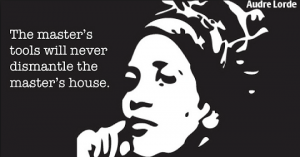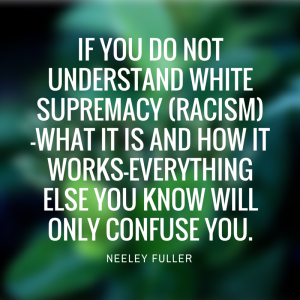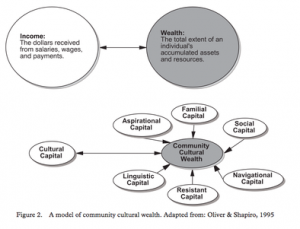
This alludes to the notion that we need to reform our education institutions that are oppressive in nature if we are ever to move forward.
youngmormonfeminists.org
I had never had to think about race until I moved to Canada. Growing up, most if not all people around me looked like me. This therefore meant that conversations about race were minimal to non existent. Most of these conversations were had in school when we discussed colonization or went on about our favourite Mexican soap operas that are still very popular in local TV shows. This blog would however be incomplete if I failed to mention the fact that the western way of life was always depicted as being better than our own, or at least that is how it occurred to me. I first experienced blatant discrimination because of my race here in Canada and I came to the quick realization that I was black and that my skin colour alone predetermines a lot of factors that occur in my day to day life. Race suddenly became a big part of my identity. The articles on Critical Race Theory resonate with me so much that I felt compelled to blog about them.

http://likesuccess.com/
Gloria Ladson’s, Just What is Critical Race Theory talks about CRT as an important and intellectual social tool for deconstructing oppressive structures and discourses, reconstruction of human agency and construction of equitable and socially just relations of power. She criticizes the notion of categorizing “whiteness” with terms such as school achievement, beauty and science while “blackness” is associated with underclass, gang’s, welfare recipients etc. She argues that CRT is important because it gives people of colour(POC) a voice thus integrating their experiential knowledge and allowing them to name their own realities. Gloria provides some key insights on how CRT can be incorporated in education to challenge the oppressive nature of education that usually undermines POC and their experiences. Tara J Yosso in Whose Culture has Capital analysis of CRT proposes similar arguments and criticizes the normative nature of judging all other forms of knowledge relative to the white middle class culture which is often portrayed as the standard. CRT therefore challenges the deficit way of thinking that is often associated with communities of colour. She details the various forms of community cultural wealth that POC bring to the table like linguistic capital which are often not acknowledged in schools because they do not conform to the cultural capital that is considered valuable like technological skills that a white middle class would posses as a result of having access to a computer from a young age. She however brings a very important perspective of us not thinking of racial oppression in terms on black and white because that also undermines the experiences of other minority groups and POC. This is a perspective that seems to be missing in Gloria’s article.

A model of community cultural wealth.
(Tara J Yoso; Cultural Capital and Critical Race Theory.)
Reading through those articles I could not help but think about my own experiences as a black student in Canada. Many at times I have felt inadequate because eloquence is constantly associated with intelligence; I do not consider myself eloquent in the English language. Adopting CRT in institutions will therefore shade light on other strengths that I bring to an institution like UBC. Skills such as being multilingual, resilient, a high achiever against all odds, being a peoples’ person who is able to inspire a deep sense of community in people etc.

There is strength in diversity! http://inamerica.blogs.cnn.com/
I have lost track of the number of times when both professors and students alike mentioned aid/donations as a key solution towards ending some of the challenges faced by developing countries. I find that to be a deficient and very westernized way of thinking that has, in the first place, put most African countries in the unfortunate situations that they are in right now. I hope we get to that point where race and other forms of subordination like sexism and classism can be freely discussed and addressed in education institutions without tension being created. This will be a necessary step as we work towards educational reform.
